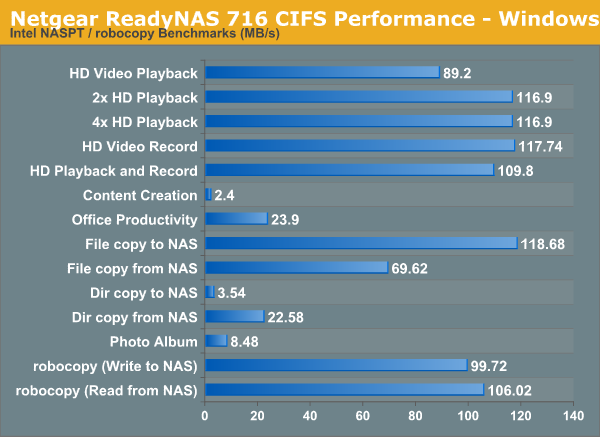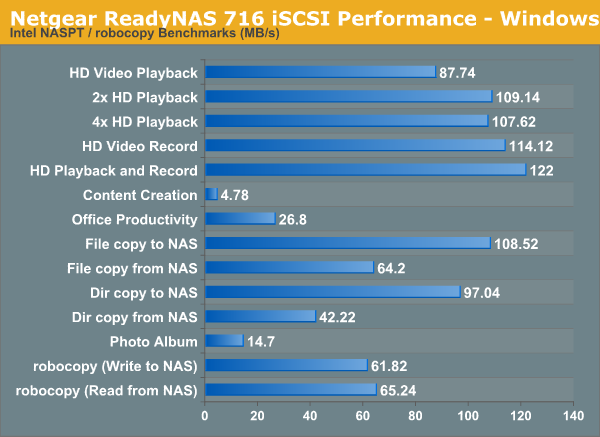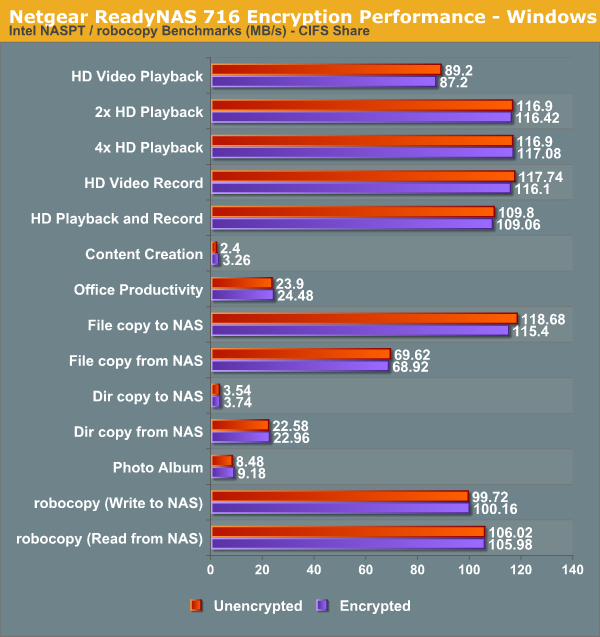Netgear ReadyNAS 716 Review: 10GBase-T in a Desktop NAS
by Ganesh T S on January 1, 2014 3:00 PM EST- Posted in
- Enterprise
- NAS
- NetGear
- 10G Ethernet
Single Client Performance - CIFS and iSCSI on Windows
The single client CIFS performance of the Netgear ReadyNAS 716 was evaluated on the Windows platforms using Intel NASPT and our standard robocopy benchmark. This was run from one of the virtual machines in our NAS testbed. All data for the robocopy benchmark on the client side was put in a RAM disk (created using OSFMount) to ensure that the client's storage system shortcomings wouldn't affect the benchmark results. It must be noted that all the shares / iSCSI LUNs are created in a RAID-5 volume.

We created a 250 GB iSCSI target and mapped it on the Windows VM. The same benchmarks were run and the results are presented below.

Encryption Support Evaluation:
Consumers looking for encryption capabilities can opt to encrypt a iSCSI share with TrueCrypt or some in-built encryption mechanism in the client OS. However, if requirements dictate that the data must be shared across multiple users / computers, relying on encryption in the NAS is the best way to move forward. Most NAS vendors use the industry-standard 256-bit AES encryption algorithm. One approach is to encrypt only a particular shared folder while the other approach is to encrypt the full volume. Some NAS vendors have support for both approaches in their firmware, but Netgear only opts for the latter. Details of Netgear's encryption strategy can be found in forum thread, but the summary is that encryption relies on a key created and stored in a mounted USB drive at the time of volume creation (the volume can't be X-RAID, but has to be set up in a manual RAID level). The USB key needs to be present at boot time for the encrypted volume to be mounted, but, can be removed later. This allows for maximum security, as the encrypted data remains safe even if the unit itself is stolen.
On the hardware side, encryption support can be in the form of specialized hardware blocks in the SoC (common in ARM / PowerPC based NAS units). In x86-based systems, accelerated encryption support is dependent on whether the AES-NI instruction is available on the host CPU (not considering units based on the Intel Berryville platform). Fortunately, the Xeon CPU used in the Netgear ReadyNAS 716 does support AES-NI. So, we can expect performance loss due to encryption enabling to be minimal / non-existent.
We enabled encryption on a a CIFS share to repeat our Intel NASPT / robocopy benchmarks. The results are presented in the graph below (with the unencrypted folder numbers for comparison purposes).

As expected, encryption carries almost no performance hit. In a number of cases, the numbers seem to even favour the encryption case. It goes to show that the bottleneck is on the disk or network side for those cases, rather than the RAID and encryption-related computation on the NAS CPU.










24 Comments
View All Comments
Runiteshark - Wednesday, January 1, 2014 - link
Some tests being multi-client CIFS. Look at the throughput he's getting on a single client. I'm pushing 180MBps cifs and 200MBps through NFS LAGGing dual 1gs to a single client. Host pushing this data is a 72 bay Supermicro chassis w/ Dual e5-2697v2's, 256GB of RAM, 72 Seagate 5900rpm NAS drives x4 Samsung 840 Pro 512GB SSDs, 3 LSI 2308 controllers, and a single Intel X520-T2 double 10G nic hooked up to an Extreme X670V over twinax with a frame size of 9216. Typical file type are medium size files at roughly 150mb each, copying with 48 threads of rsync.One thing that I didn't see in the test bed was the configuration of jumbo frames which definitely changes the characteristics of single client throughput. I'm not sure if you can run large jumbo frames on the Netgear switch.
If I need 10g which I don't because the disks/proc in the microserver couldn't push much more, I could toss in a double 10G intel adapter for roughly $450.
imsabbel - Thursday, January 2, 2014 - link
Thats because his single client tests only use a single 1 GBit connection on the client side.. I know, its stupid, but the fact that ALL transfor tests are literally limited to something like 995Mbits/s should have given you a clue that Anandtech does strange things with their testing.Runiteshark - Friday, January 3, 2014 - link
I didn't even see that! What the hell was the point of the test then?Gigaplex - Wednesday, January 1, 2014 - link
Am I reading this correctly? You used 1GbE, not 10GbE adapters on the test bed? I'd like to see single client speeds using 10GbE.ZeDestructor - Wednesday, January 1, 2014 - link
6 quad-port NICs + 1 on-board NIC, so 25 gigabit ports split over 25VMs.As for single-client speeds, it should be possible to get that using LAGs and is a worthy point to mention, easily possible even with the current setup, although I would like to see some Intel X540 cards in use myself...
BMNify - Thursday, January 2, 2014 - link
hmm am i missing something here ?you only use a 6 x Intel ESA I-340 Quad-GbE Port Network Adapter
as in only using 4 "1GbE" ports and NO actual "10GbE" card to max out the end to end connection ?
dont get me wrong, its nice to finally get a commercial SOHO type unit that's actually got 10GbE as standard after decades of nothing but antiquated 1GbE cards at reasonable prices but you also NEED that new extra 10GbE card to put in your PC alongside those 10GbE router/switch so this 3K NAS is way to expensive for SOHO masses today alas.
ganeshts - Thursday, January 2, 2014 - link
6x quad ports = 24 1-GbE ports + one onboard 1GbE = 25 GbE in total.BMNify - Thursday, January 2, 2014 - link
oh right so its 25 "1GbE" ports and NO actual "10GbE" card to max out the end to end connectionBMNify - Thursday, January 2, 2014 - link
it still seems very odd to have a collection of 24 threads over a dual socket 6 core 12 thread test bench with 10GbE router/switch and this 3K NAS with dual "10GbE" card that could be bonded together at both end's and yet AT just test the kit to the 1GbE port bottle neck, and dont even install another dual "10GbE" card in the pc end then try for instance starting several concurrent ffmpeg upscaling and encoding high profile/bitrate 1080P content to UHD over iSCSI etc to the "10GbE" NAS to max out the all the 12 cores/24 threads SIMD or other options to try and push that exclusive "10GbE" connection rather than any old combination of antiquated "1GbE" cardshoboville - Thursday, January 2, 2014 - link
I hate sounding like a naysayer, but these boxes are so expensive. You can build a system with similar specs for much less under FreeNAS and ZFS (as other commentators have noted). Supermicro makes some great boards, and with the number of case options you get when DIY, expandability is very much an option if you need it further down the road. Then again, alot of the cost comes from 10 gbit NICs which cost a lot.